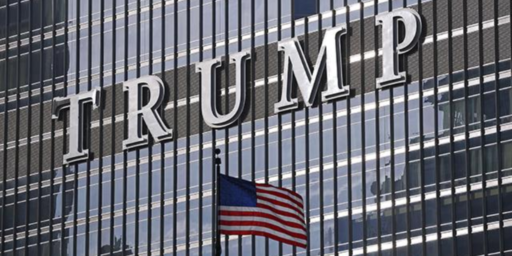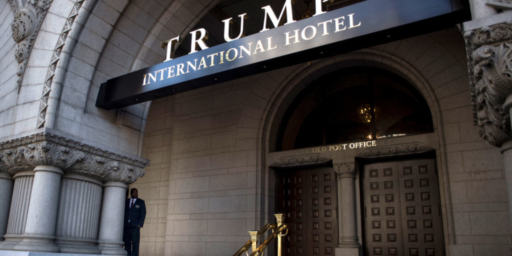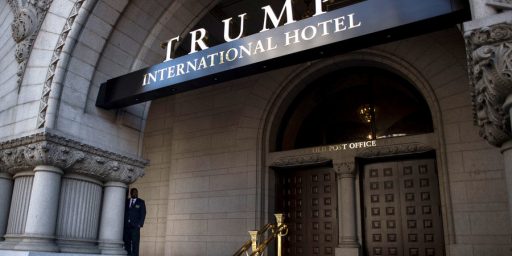SCOTUS Kills Trump Emoluments Suit
The Emoluments Clause is essentially unenforceable.

The U.S. Supreme Court denied cert to Members of Congress appealing the DC Circuit’s ruling that they lacked standing to sue President Trump for violating the Emoluments Clause.
Reuters (“U.S. Supreme Court ends Democratic lawmakers’ anti-graft lawsuit against Trump“):
The Supreme Court on Tuesday put an end to a lawsuit brought by congressional Democrats that accused President Donald Trump of violating anti-corruption provisions in the U.S. Constitution with his business dealings.
The justices refused to hear an appeal by 215 Senate and House of Representatives Democrats of a lower court ruling that found that the lawmakers lacked the necessary legal standing to bring the case that focused on the Republican president’s ownership of the Trump International Hotel in Washington.
The lawmakers accused Trump of violating the Constitution’s rarely tested “emoluments” clauses that bar presidents from taking gifts or payments from foreign and state governments without congressional approval. The lead plaintiff in the case is U.S. Senator Richard Blumenthal of Connecticut.
“Standing” in political disputes is a sufficiently arcane legal concept that I have no strong view on the merits. The fact that the DC Circuit ruled this way makes me reasonably confident that this wasn’t a partisan action by SCOTUS. The University of Georgia’s Matthew Hall makes a persuasive case that Congress should have standing but I’m sure I could find solid counter-arguments with more effort. Further, there are several SCOTUS rulings over the years denying Members of Congress from suing over policy disputes in that capacity, arguing that they can’t claim to speak for the institution as a whole.
Trump faces two similar lawsuits – one brought by an advocacy group and the other by the Democratic attorneys general of Maryland and the District of Columbia. Those cases likely would be dismissed as moot if Trump loses his Nov. 3 re-election bid, according to University of Richmond law professor Carl Tobia.
If Members of Congress lack standing, I don’t see how state AGs would have it. The more interesting case is the CREW suit, whose plaintiffs include DC hoteliers directly impacted by having to compete against a hotel owned by the President. But they have been winding there way through the system for three years and, as Tobia correctly notes, it becomes a moot issue if Trump’s tenure ends on January 20.
The Trump deal with the Old Post Office itself raises all manner of legal issues, none of which have been resolved. For all intents and purposes, then, the President is above the law if there is no judicial remedy that can be reached during his time in office.
The House could very well have impeached Trump for the Emoluments violations, at very least adding additional charges during the last impeachment process. Speaker Pelosi and the rest of the Democratic leadership thought the better of it. Alas, that, too is a moot point in that, unless the opposite party controls the Senate by wide margins, no President is likely going to be removed via that mechanism.
Again, if impeachment is a remedy only on paper and nobody has standing to sue for judicial relief, then the Emoluments Clause and other Constitutional restrictions amount to suggestions rather than the supreme law of the land. That’s decidedly less than ideal.





What we’re learning here is that:
1) A kakistocracy is all that is needed to subvert the intent of the Constitution.
2) That standing is both squishy and yet paramount.
3) That the character of who we elect matters greatly–without this, there’s simply no longer any expectation to follow norms. Or the rule of law, for that matter, as there are literally no teeth where the President is concerned.
This is all actually fairly disturbing, because Trump has certainly laid the groundwork for what can be ignored in the future. Past is precedent.
ETA: Hey the edit button! Cool. 🙂
Your assessment is correct, there is no way to enforce the emoluments clause against a POTUS who is even moderately wealthy. You can delay this stuff until it doesnt matter anymore. If there is anything Trump is actually good at (besides hairstyling), it is using legal counsel to his benefit.
Steve
Since the SC wasn’t asked, I don’t suppose they volunteered, theoretically, exactly who may have standing.
I guess my next question is whether Congress can define in advance how that Clause can be implemented in law.
Seems to me this is in the same category as the Hatch Act. Something that is violated but no one can do anything about.
Square this decision with Originalism. Why is there an Emoluments Clause if the Founders didn’t believe that it was needed to contain a president?
The states’ case against Trump with regard to standing, could turn on a Federalism argument.
@Scott:
IANAL but the handful of law journal articles I’ve read on the subject suggests that they can indeed.
@Sleeping Dog:
The Framers, for all their brilliance, didn’t always do a good job of seeing obvious pitfalls. They likely presumed that, having written it in the Constitution, the aristocrats of high character who the Electors would make President would simply follow it. Further, having failed to anticipate political parties even though they already existed, they presumably figured that a President so uncouth as to violate it would be removed from office forthwith via the impeachment process.
@Jen: The post by Dr. Joyner reminds me more of a situation that I encountered in one district in which I taught years ago. I discovered the need to inquire of an adminstrator about how “zero” the supposedly “zero-tolerance policy” on drugs was for the school. In his reply, he thanked me for my discretion in seeking guidance noting that the policy was not designed to keep drugs out of the school but rather was a tool that allowed the administration the leeway necessary to “go after kids we don’t like” without having to endure the complaints of the parents of said kids.
I suppose that the lesson here might be about kakistocracies, but the voice from the abyss where my soul lies in repose is noting that it is probably just as likely that the clause was simply an agreement among gentlemen offered with a nod and a wink to appease the rubes and identify who might get elected who was “not one of ours.”
@James Joyner:
You mean grifters…
In seriousness, this seems to be the court avoiding a problem.
@Sleeping Dog: Maybe. But there have been a lot of standing rulings already and the DC Circuit was following what most legal scholars seem to think was clear precedent. Under the circumstances, it would have been weird for SCOTUS to take the case, particularly with only 8 Justices.
…and like clockwork, James, you endorse yet another Supreme Court decision that was obviously crafted with the Republican majority’s party interests in mind. I notice that in this case you didn’t even really try to find a legal rationale (“The University of Georgia’s Matthew Hall makes a persuasive case that Congress should have standing but I’m sure I could find solid counter-arguments with more effort.”) That lack of consideration didn’t prevent you from bowing to the wisdom of the Republican court majority. A major and important part of the constitution is ruled unenforceable (for Republican presidents) by these so called originalists but it must be all fine and non-partisan because… reasons. And when they reverse themselves when a Democrat holds the presidency? No doubt you will find reasons for that too.
@MarkedMan: As noted in the OP, the court here simply refuses to revisit the DC Circuit’s ruling. It is not known as a hotbed of conservative radicalism. I think this is just a technical rejection in line with a long litany of standing cases. (Notably, the Court declined to allow a group of Congressmen sue to overturn the line item veto back in 1996. )
I think this is frustrating proceduralism rather than partisanship.
@Scott:
In principle, Congress can pass any law that can get enough votes to pass, regardless of what the law says. So, surely they can pass a law to enforce the emoluments clause of the Constitution. In fact, I think it’s rather necessary for two reasons: 1) it’s a matter of time another kleptocrat like Trump will make it to the White House, 2) most presidential candidates are rather well off, and could easily follow trump’s example, if at a reduced scale, on how to enrich themselves through assets, businesses, etc. they no longer need to divest from or even place in a blind trust.
I’d also love a law stating the president, or Trump as the case may be, cannot be prosecuted while in office, but can be indicted during their term in order to fit under the limits of any statute of limitations which may apply.
@James Joyner:
And I am about 98% confident that if the DC Circuit court had ruled the other way, the Republican Supreme Court would have overturned them. Just as they ruled today that although the constitution says there must be a census every ten years, the accuracy of the census doesn’t matter and it is totally left up to the (Republican) president to manipulate as he sees fit. Another decision that will be reversed if there is a Democrat in that seat in 2030.
@MarkedMan: I haven’t read enough to digest that ruling—and there’s no opinion associated with it—but I gather that it comes down to whether the Executive or the Judiciary runs the Census.
I’m inclined to agree with Wall, even while thinking the rationale for cutting the count short is malevolent.
Ha!
I think this is an excellent illustration of how reasonable judicial precedents can be combined to create an environment in which there are “in-groups whom the law protects but does not bind, alongside out-groups whom the law binds but does not protect” (after Frank Wilhoit: “Conservatism consists of exactly one proposition…”).
By itself, it it is not unreasonable to hold that individual legislators (as opposed to Congress as a whole) have no standing to sue the executive. It’s not hard to see how this could be abused for partian purposes.
However, combine this with the legal theory that a sitting president cannot be indicted, and suddenly nobody of substance can touch the president. And there we have the “”in-groups whom the law protects but does not bind.”
Which is exact the goal of every Federalist Society hack who ever pretended to call balls and strikes.
And if you believe that the current SCOTUS would care to uphold these precious precedents when a Democratic president would pull one-tenth of the shit that Trump is getting away with, I have a bridge to sell you.
Smart lawyers don’t come up with transparently silly laws, they tinker with the details of jurisprudence so that they can say “Oh, it’simply the law. There is nothing to be done,” while, in fact, they got exactly what they intended to end up with. It’s called playing the long game.
@drj: So, explain why the DC Circuit ruled as it did.
@James Joyner:
Isn’t there a rule about conservative dichotomies?
You think that pile of cotton candy on his head looks good!?
How naïve they were…
Really didnt think the hairstyling comment needed a sarcasm alert.
Steve
@steve: Ya got me there…although, unfortunately, Trump has been successful using legal counsel to his benefit…
@James Joyner:
Replace the word “Census” with any other word or phrase of your choice, and you have now argued that the Judiciary has no role nor authority whatever. After all, the Constitution does not anywhere state that the Judiciary runs anything. Right?
@Just nutha ignint crackerd:
I have a great story about that from high school. Too long to tell in full, but in summary: zero tolerance did not apply to a student whose absence would hurt the football team.
@James Joyner:
Because they are bound by by the precedent established by a higher court that is currently politically hostile to holding a Republican president accountable.
But that doesn’t mean that all lower courts are equally bound by precedent (or fairness).
For instance, the conservative 5th Circuit Court of Appeals must believe that there is at least a good chance that the Supremes will go along with their transparently bullshit reasoning about having a single ballot drop-off spots per county.
So they dare to push the envelope, while the DC Circuit Court must show restraint.
It is no coincidence that prima facie ridiculous challenges to Democratic legislative achievements are brought forward in lower courts the very minute the ideological make-up of higher courts changes.
“We got ourselves a new Supreme Court justice, let’s launch yet another bullshit fetal heartbeat bill attacking well-established legal precedent,” is the standard modus operandi of “pro-life” activists all over the country.
And you know what? It works.
Just gotta say, it is most decidedly NOT a moot issue when Trump’s tenure ends on January 20. The problem does not go away just because he does. Maybe the lawsuits do, but the issue remains.
@James Joyner: “I gather that it comes down to whether the Executive or the Judiciary runs the Census.”
As has been stated above, you can swap out *any* action of the Executive into that statement.
@Barry: My strong predisposition is that the political branches should be allowed to do what they are elected to do unless the act in violation of the Constitution or, in the case of the Executive, statutory law.
Not to worry. As soon as the Repubs find any sliver of evidence that President Biden may be treading a fine line wrt the Emoluments Clause, it will become enforceable as soon as they can get the case before the Supremes.
@Mike Schilling: It’s probably really the same story. In mine the person in question was the star on the volleyball team headed for the state tournament.